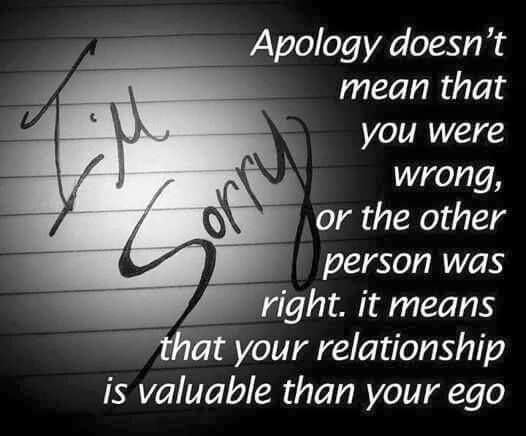"Apology: A Bridge to Stronger Relationships, Not a Sign of Defeat"
This blog explores the true meaning behind apologizing and how it can be an act of humility and growth in relationships. It highlights the idea that an apology is not about being right or wrong, but about valuing the relationship more than one's own ego. The image we’re discussing sheds light on this idea, encouraging readers to see apologies as a powerful tool for healing and reconnection.


Blog Content:
In any meaningful relationship—whether personal or professional—conflicts and misunderstandings are inevitable. When these moments arise, our instincts often push us to protect our pride, defend our actions, and avoid admitting fault. However, the true power of an apology lies in something much deeper than right or wrong.
The quote from the image beautifully sums it up: "Apology doesn’t mean that you were wrong, or the other person was right. It means that your relationship is more valuable than your ego."
This is a critical distinction. Apologizing isn't about admitting defeat or weakness. Instead, it is an act of humility that acknowledges the importance of the bond you share with the other person. By apologizing, you are essentially saying that the relationship matters more than your pride.
Why Apologizing is Important:
An apology has the ability to heal wounds, build bridges, and restore trust. It is a reflection of maturity and emotional intelligence. While it's easy to hold onto the belief that we must always be "right" to win an argument or conflict, doing so can often lead to a breakdown in communication and closeness.
On the other hand, a well-timed and heartfelt apology can transform a tense situation into an opportunity for growth. It encourages mutual respect and a deeper understanding of each other’s feelings and perspectives.
Apologizing as a Tool for Growth:
In relationships, whether with family, friends, or romantic partners, disagreements are a part of life. However, it's not the conflict itself that defines the relationship—it’s how we respond to it. Apologizing when necessary shows that we are willing to prioritize the connection over our individual egos. It signals to the other person that their feelings matter and that their worth is greater than being "right" in any given moment.
Apologizing does not mean you are admitting complete fault, nor does it mean the other person is always right. Instead, it’s about showing empathy, accepting responsibility for your part in the conflict, and expressing a desire to move forward with mutual understanding.
Conclusion :
In the end, true strength comes from vulnerability. Apologizing doesn't diminish you; it elevates the relationship you share. By valuing the relationship over your ego, you create the foundation for trust, respect, and emotional intimacy. The next time a disagreement arises, remember that saying "I'm sorry" can be more than just an apology—it can be a step toward a stronger, healthier relationship.
Apologies are not signs of weakness but rather a testament to our commitment to those we care about. So, choose love over pride, and let your relationships flourish.
